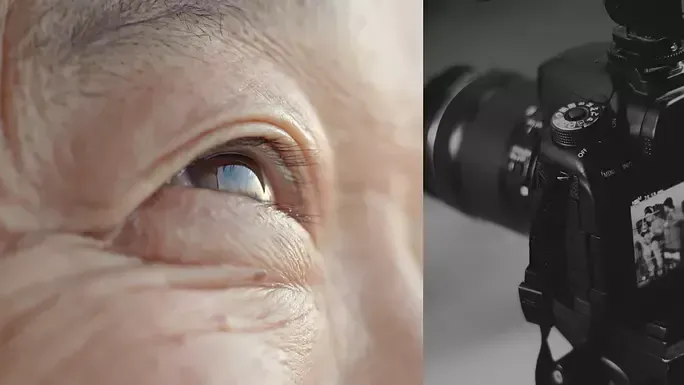What is Macular Degeneration?

Did you know macular degeneration is the leading cause of severe vision loss for patients over 60 years old? Since this month is age-related macular degeneration (AMD) and low vision awareness month, let’s discuss the disease, what can occur, and ways you can minimize your risks of vision loss.
The retina (inner lining of the eye) acts much like a camera film for our vision- it captures everything we see. The macula is at the center of the retina and is the area you use to see the sharpest and clearest. Patients who have macular degeneration start having irregularity to this area which in turn affects their central vision. It would be like having a great camera, but the film has a blurry smudge in the center every time a picture is taken.
There are two types of macular degeneration that doctors will typically reference- dry or wet. The dry form of AMD occurs when there is a buildup of deposits in the retina known as drusen. There is no current treatment for it, but this will not typically affect vision as significantly early on. Wet AMD is less common but refers to abnormal vessels growing and bleeding into the retina. This will reduce central vision quickly and needs to be treated soon after to minimize scarring and irreversible vision loss. Treatment includes injections of an anti-VEGF drug that prevents growth of these unnecessary vessels.
Patients are evaluated for their risks of macular degeneration at every comprehensive exam. Between photos of the retina and observation behind the microscope, we evaluate for any physical changes. OCT scans (like a CT for the eye) are also taken which can help detect early changes that aren’t always visible, and another scan is used as necessary if wet AMD is suspected. Our doctors will discuss any concerns they see and address questions you may have.
Family history of AMD or lighter skin color increases a person’s risk factor for the disease. However, we educate patients to be proactive in maintaining a great diet with leafy green vegetables, wearing sun protection when outside, not smoking, and exercising regularly. We also carry Macular Protect multivitamins for patients diagnosed with AMD and Ocular Essentials multivitamins for those who have family history of the disease. These supplements can work alongside a good diet to minimize progression. Changes can occur in the macula long before symptoms occur, so a yearly comprehensive eye exam is essential to ensuring you have great vision for life.


